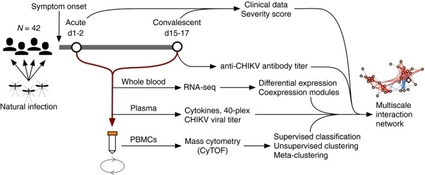A data-drive model of pediatric immune reaction to chikungunya virus infection.
A recently published study used multiple profiling techniques in a comprehensive assessment of natural pediatric infection with CHIKV. Researchers compared the acute and convalescent phases of 42 pediatric cases of CHIKV from a hospital-based study in Nicaragua.
The analysis combined RNA-seq, CyTOF, and multiplex bead array ELISA data with semi-supervised classification and clustering methods in a systems immunology approach to identify changes in cell subpopulation frequencies, gene expression, and serum cytokine/chemokine concentrations during acute CHIKV infection. Their findings highlight the prominent role of monocytes in response to acute infection.
This work was supported by the NIAID DAIT Human Immunology Project Consortium.
For study protocols and data, see ImmPort SDY1288.


